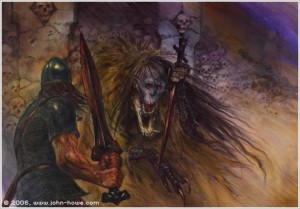 One for Anglo-saxonists and lovers of poetry: BBC Radio 4 is set to air a recording of the late Irish poet Seamus Heaney reading his translation of Beowulf next week in 10 separate 15-minute installments. The first episode of 10 is set to air on BBC Radio 4 on Monday at 09:45 BST.
One for Anglo-saxonists and lovers of poetry: BBC Radio 4 is set to air a recording of the late Irish poet Seamus Heaney reading his translation of Beowulf next week in 10 separate 15-minute installments. The first episode of 10 is set to air on BBC Radio 4 on Monday at 09:45 BST.
Heaney was an internationally recognised Nobel Prize-winning poet. He died earlier this month at the age of 74. Professor Michael Drout, noted Anglo-saxonist and author of Beowulf and the Critics by J.R.R. Tolkien has described Heaney’s translation as “the most poetic”. A publication of Tolkien’s own translation of has been in limbo for more than a decade. Continue reading “BBC Radio 4 to air Seamus Heaney reading Beowulf”
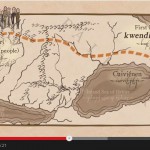 What do Game of Thrones’ Dothraki, Avatar’s Na’vi, Star Trek’s Klingon and LOTR’s Elvish have in common? They are all fantasy constructed languages, or conlangs.
What do Game of Thrones’ Dothraki, Avatar’s Na’vi, Star Trek’s Klingon and LOTR’s Elvish have in common? They are all fantasy constructed languages, or conlangs.
Conlangs have all the delicious complexities of real languages: a high volume of words, grammar rules, and room for messiness and evolution. In this TED Talk, John McWhorter explains why these invented languages captivate fans long past the rolling credits. Continue reading “Are Elvish, Klingon, Dothraki and Na’vi real languages?”
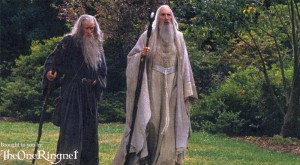 In this new TORn Library piece, our newest feature writer Gibbelins examines the difference between skill and knowledge and whether the former has an unjustly sullied reputation in Middle-earth as a result of the rash and self-seeking acts of craftsmen such as Saruman and Fëanor.
In this new TORn Library piece, our newest feature writer Gibbelins examines the difference between skill and knowledge and whether the former has an unjustly sullied reputation in Middle-earth as a result of the rash and self-seeking acts of craftsmen such as Saruman and Fëanor.
Two paths of Wisdom
by Gibbelins
The concepts I wish to discuss are best expressed with the Quenya roots ‘curu-‘ and ‘nolo-‘, but I will try not to subject you to the Elvish for the entire essay. Both of these roots have at times been translated as ‘wisdom’, and yet they represent different sides of wisdom and different inclinations. I’ll use the English glosses ‘skill’ and ‘knowledge’ as reasonable approximations. The contrast between the two ideas is, I think, fundamental to Tolkien’s understanding of how to live righteously. Continue reading “On Tolkien’s two paths of wisdom”
If you have a Tolkien/Middle-earth inspired poem you’d like to share, then send it to poetry@theonering.net. One poem per person may be submitted each month. Please make sure to proofread your work before sending it in. TheOneRing.net is not responsible for poems posting with spelling or grammatical errors.
 In this piece on his blog Midgardsmal, linguist David Salo writes about how he derived various Orkish dialects used in the Lord of the Rings films from his own extrapolations of Black Speech, and
In this piece on his blog Midgardsmal, linguist David Salo writes about how he derived various Orkish dialects used in the Lord of the Rings films from his own extrapolations of Black Speech, and
about his thoughts on the approach Sauron might have taken in putting together Black Speech itself.
Continue reading “David Salo on Black Speech, orc dialects and the mind of Sauron”
If you have a Tolkien/Middle-earth inspired poem you’d like to share, then send it to poetry@theonering.net. One poem per person may be submitted each month. Please make sure to proofread your work before sending it in. TheOneRing.net is not responsible for poems posting with spelling or grammatical errors.
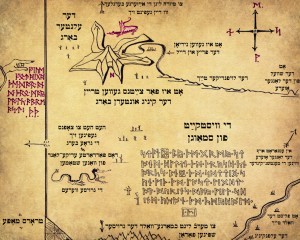 Thanks to Ringer Tajik for the heads-up on this interesting read about a Yiddish translation of The Hobbit.
Thanks to Ringer Tajik for the heads-up on this interesting read about a Yiddish translation of The Hobbit.
Cool quote that gives some insight into the difficulties of translating texts:
But when Bilbo Baggins played with the meaning of his name in a long discussion with the dragon Smaug, Goldstein was forced to admit defeat. “There’s no way to do it, there’s just no way to translate it,” Goldstein said. “So, I put in a footnote and said, ‘This is a pun and I give up.’ ”
For one of his first translation projects after his retirement, Barry Goldstein, a former computer programmer, found an empty table at his local Starbucks in Boston and settled in to work on the “Treebeard” chapter from J.R.R. Tolkien’s Lord of the Rings trilogy. But Goldstein soon realized that he needed something more sizable to occupy his time: 95,022 words later, he had translated the entire text of The Hobbit, the prequel to the Ring series, into Yiddish.
Only a little more than 130 copies of Goldstein’s translation have sold since it was released in December. But as Goldstein tells it, he always knew Der Hobit wouldn’t be a best-seller, and the sales were still double his original two-figure estimate.
In the heyday of Yiddish literature, the translation of literary classics into the mamaloshen was entirely commonplace. The prewar Yiddish readership is estimated at about 10 million—many of whom spoke Yiddish as their first language and had a rabid appetite for the classics of world literature.
Some of the best-selling Yiddish adventure stories included gems like Robert Louis Stevenson’s Treasure Island, Jack London’s Klondike series, and Mark Twain’s The Adventures of Tom Sawyer. “There was a sense that we had to catch Yiddish up with the world and modernism and that any important literary phenomenon that was taking place in the larger world had to be conveyed to the Yiddish-speaking world,” said Miriam Udel, a professor of Yiddish at Emory University. “The cultural ambitions of Ashkenazic Jewry were on the grandest scale, so they didn’t think of themselves as having a small or minority literature or a cultural complex.”
[Read More]
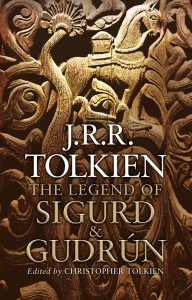 In my internet wanderings, I sometime stumble on cool Tolkien things. Not necessarily news, but interesting — like this transcript of a live chat with renowned Tolkien scholar Professor Tom Shippey (author of the acclaimed J.R.R. Tolkien: Author of the Century) over on Tolkien Library to celebrate the release of The Legend of Sigurd and Gudrun back in 2009.
In my internet wanderings, I sometime stumble on cool Tolkien things. Not necessarily news, but interesting — like this transcript of a live chat with renowned Tolkien scholar Professor Tom Shippey (author of the acclaimed J.R.R. Tolkien: Author of the Century) over on Tolkien Library to celebrate the release of The Legend of Sigurd and Gudrun back in 2009.
Yes, we can all agree that’s fairly old.
However, if you’re interested in Norse myth, Shippey’s thoughts on Tolkien’s parallels with other early fantasists such as William Morris, Lord Dunsany and E.R. Eddison, as well as what he thought of meeting Tolkien himself, then you’ll find (like I did) this a worthwhile read. Continue reading “Tom Shippey talks Tolkien and Norse myth”
If you have a Tolkien/Middle-earth inspired poem you’d like to share, then send it to poetry@theonering.net. One poem per person may be submitted each month. Please make sure to proofread your work before sending it in. TheOneRing.net is not responsible for poems posting with spelling or grammatical errors.
 One for Anglo-saxonists and lovers of poetry: BBC Radio 4 is set to air a recording of the late Irish poet Seamus Heaney reading his translation of Beowulf next week in 10 separate 15-minute installments. The first episode of 10 is set to air on BBC Radio 4 on Monday at 09:45 BST.
One for Anglo-saxonists and lovers of poetry: BBC Radio 4 is set to air a recording of the late Irish poet Seamus Heaney reading his translation of Beowulf next week in 10 separate 15-minute installments. The first episode of 10 is set to air on BBC Radio 4 on Monday at 09:45 BST.


 What do Game of Thrones’ Dothraki, Avatar’s Na’vi, Star Trek’s Klingon and LOTR’s Elvish have in common? They are all fantasy constructed languages, or conlangs.
What do Game of Thrones’ Dothraki, Avatar’s Na’vi, Star Trek’s Klingon and LOTR’s Elvish have in common? They are all fantasy constructed languages, or conlangs.  In this new TORn Library piece, our newest feature writer Gibbelins examines the difference between skill and knowledge and whether the former has an unjustly sullied reputation in Middle-earth as a result of the rash and self-seeking acts of craftsmen such as Saruman and Fëanor.
In this new TORn Library piece, our newest feature writer Gibbelins examines the difference between skill and knowledge and whether the former has an unjustly sullied reputation in Middle-earth as a result of the rash and self-seeking acts of craftsmen such as Saruman and Fëanor. In this piece on his blog Midgardsmal, linguist David Salo writes about how he derived various Orkish dialects used in the Lord of the Rings films from his own extrapolations of Black Speech, and
In this piece on his blog Midgardsmal, linguist David Salo writes about how he derived various Orkish dialects used in the Lord of the Rings films from his own extrapolations of Black Speech, and
 In my internet wanderings, I sometime stumble on cool Tolkien things. Not necessarily news, but interesting — like this transcript of a live chat with renowned Tolkien scholar Professor Tom Shippey (author of the acclaimed J.R.R. Tolkien: Author of the Century) over on Tolkien Library to celebrate the release of The Legend of Sigurd and Gudrun back in 2009.
In my internet wanderings, I sometime stumble on cool Tolkien things. Not necessarily news, but interesting — like this transcript of a live chat with renowned Tolkien scholar Professor Tom Shippey (author of the acclaimed J.R.R. Tolkien: Author of the Century) over on Tolkien Library to celebrate the release of The Legend of Sigurd and Gudrun back in 2009.